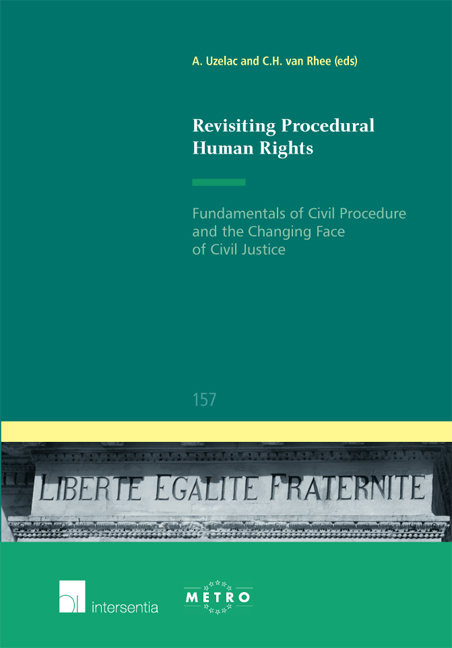 Revisiting Procedural Human Rights
Revisiting Procedural Human Rights from Fundamental Procedural Rights from a National Angle
Published online by Cambridge University Press: 13 October 2018
1. Introduction
A civil action could, in the words of Eduardo Couture, be described as ‘civilisation's substitute for vengeance’.
In a civilised country, it is therefore to be expected that:
(a) the right of all;
(b) to have access to courts;
(c) by means of civil proceedings;
(d) to have any dispute that can be resolved by the application of law decided;
(e) be guaranteed.
In South Africa, where post-apartheid the Constitution of the Republic of South Africa, 1996, reigns supreme, that right is guaranteed in the Bill of Rights embodied in the Constitution, Section 34 whereof provides:
Access to courts
34. Everyone has the right to have any dispute that can be resolved by the application of law decided in a fair public hearing before a court or, where appropriate, another independent and impartial tribunal or forum.
As explained in a previous contribution, the word ‘procedure’ means ‘going forward’ and, viewed as such, (a) aims at moving forward the dispute between the parties up to the point of its eventual determination by a court and (b) aims at reflecting the evolution of society and its needs.
The question therefore arises, as far as South Africa is concerned, what is happening to fundamental procedural guarantees in the area of civil justice – is it ‘going forward’, or not?
In answering this question, it is of material importance to keep in mind that 20 years ago South Africa advanced from a system of parliamentary sovereignty to one of constitutional supremacy and that, as such, the way was paved for a rights-based jurisprudence, in which the rules of civil procedure themselves are from time to time subject to constitutional scrutiny and challenge.
In our new dispensation the state is required to ‘respect, protect, promote and fulfil’ the rights in the Bill of Rights which rights, as stated above, include the right of access to courts. In other words, the state is constitutionally required ‘to lead by example’.
What is Happening to Fundamental Procedural Guarantees in South Africa in the Area of Civil Justice?
An analysis of the right of access to courts, as embodied in Section 34 of the Constitution, demonstrates that guaranteed by that right are, inter alia, the principles of:
(a) equality (‘everyone has the right’); and
(b) audi alteram partem (‘a … hearing before a court’).
To save this book to your Kindle, first ensure [email protected] is added to your Approved Personal Document E-mail List under your Personal Document Settings on the Manage Your Content and Devices page of your Amazon account. Then enter the ‘name’ part of your Kindle email address below. Find out more about saving to your Kindle.
Note you can select to save to either the @free.kindle.com or @kindle.com variations. ‘@free.kindle.com’ emails are free but can only be saved to your device when it is connected to wi-fi. ‘@kindle.com’ emails can be delivered even when you are not connected to wi-fi, but note that service fees apply.
Find out more about the Kindle Personal Document Service.
To save content items to your account, please confirm that you agree to abide by our usage policies. If this is the first time you use this feature, you will be asked to authorise Cambridge Core to connect with your account. Find out more about saving content to Dropbox.
To save content items to your account, please confirm that you agree to abide by our usage policies. If this is the first time you use this feature, you will be asked to authorise Cambridge Core to connect with your account. Find out more about saving content to Google Drive.